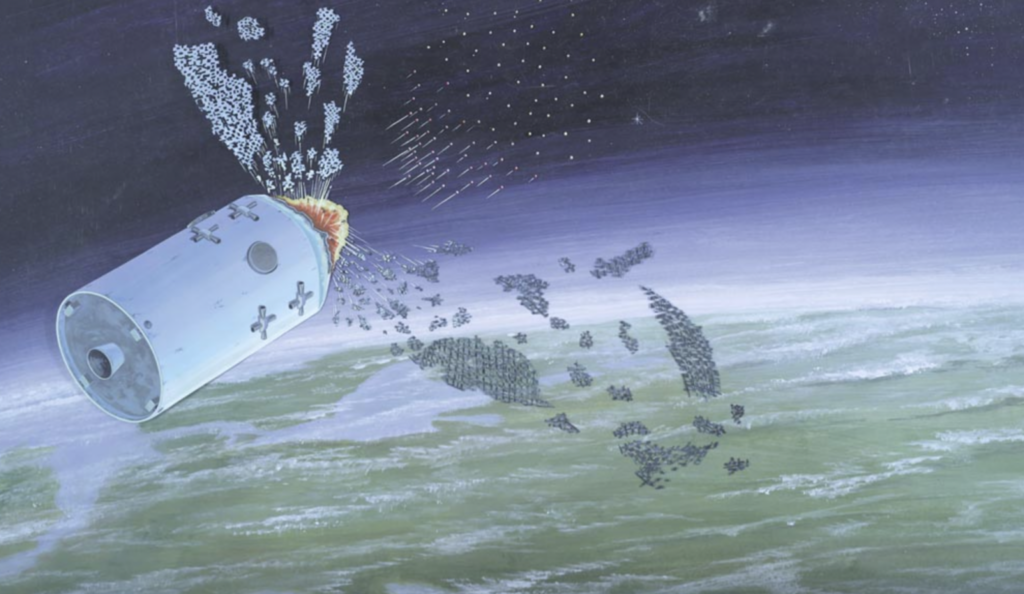US intelligence warns about Russia wanting nuclear weapons in space
By François Diaz-Maurin | February 15, 2024
 An artist’s illustration of the Soviet-era Istrebitel Sputnikov anti-satellite weapon system at work, 1986. Anti-satellite weapons can be used as a "force multiplier" for a nuclear first strike. (Credit: US Government, Public domain, via Wikimedia Commons)
An artist’s illustration of the Soviet-era Istrebitel Sputnikov anti-satellite weapon system at work, 1986. Anti-satellite weapons can be used as a "force multiplier" for a nuclear first strike. (Credit: US Government, Public domain, via Wikimedia Commons)
On Wednesday, February 14, House Representative and Chairman of the House Intelligence Committee, Michael R. Turner (R-Ohio), called on the Biden administration to declassify all information relating to a new “serious national security threat.” Turner’s statement quickly caused alarm and confusion in Washington, with many calling it “cryptic” because it did not specify what the threat exactly was.
Officials briefed on the intelligence reportedly said it was related to Russian advances in space-based nuclear weapons, although they did not further elaborate. Nuclear weapons and other weapons of mass destruction are prohibited from being placed in space under the 1967 Outer Space Treaty, to which Russia is a signed and ratified member as the Soviet Union. The treaty sought to halt the weaponization of space by the great powers during the Cold War.
One particular concern was the possible deployment of systems capable of placing nuclear warheads in low Earth orbit, which could then be launched against any location on the Earth’s surface. Considered strategically destabilizing, the development of orbital weapon systems was largely halted by the US-Soviet SALT II Treaty in 1979.
Despite these treaties, however, military activities in space have changed from the purely theoretical in recent years, with some even suggesting that warfighting is already underway. In a significant event in 2021, Russia destroyed one of its own discarded satellites still orbiting Earth. While Russia cheered the mission as a demonstration of its anti-satellite weapon system capability, US officials at the time described Russia’s action as “reckless, dangerous and irresponsible.” Countries including China, France, the United States, and Russia, have also been reported as currently developing space warfare tactics and simulations exercises.
Reports on Wednesday about Russia’s advances on space-based nuclear weapons said that US intelligence suggested that Russia’s intention was not to use these weapons on Earth but possibly against foreign satellites. Anti-satellite weapon systems, however, can potentially be used in a variety of nuclear-related missions, including as a “force multiplier” for a nuclear first strike, as a countermeasure against anti-ballistic missile defense systems, or as an electromagnetic weapon against other satellites.
The reported Russian intent is considered a threat by US officials who say that the United States currently doesn’t have a counterforce against satellite-killing orbital nuclear weapons. Reacting on X (formerly known as Twitter), Jon Wolfsthal, director of global risk at the Federation of American Scientists (and a member of the Bulletin’s Science and Security Board), wrote on Thursday that “Regardless of what Russia is building or planning to deploy, the fact remains the same that the [United States] is more dependent on Space than anyone and needs a rapid launch, satellite resilience program, like, yesterday.”
Seeking to reassure about an issue unanimously considered as “serious,” the House Intelligence Committee’s ranking member, Jim Himes (D-Conn.), added on Wednesday that the threat is “not going to ruin your Thursday.”
One nuclear bomb may ruin your whole day, but maybe not today.
(Note: CNN reported on Friday, February 16, that Russia’s new nuclear anti-satellite capability is most probably a nuclear EMP, a weapon capable of creating a pulse of electromagnetic energy to disrupt other satellites.)
Together, we make the world safer.
The Bulletin elevates expert voices above the noise. But as an independent nonprofit organization, our operations depend on the support of readers like you. Help us continue to deliver quality journalism that holds leaders accountable. Your support of our work at any level is important. In return, we promise our coverage will be understandable, influential, vigilant, solution-oriented, and fair-minded. Together we can make a difference.















It would be ironic if it weren’t so stupid. Human politicians still can’t agree to disarm all of their nukes basically because they’re too afraid of a nuclear holocaust. Same as it ever was.
I joined the Bulletin years ago because of all the great articles and my recuring nightmare of nuclear war. I read Fail Safe in grade school and it scared me more then any other threat to my wellbeing. Nuclear explosions in space have already been tested by the US and Soviet Union years ago. Project Starfish (aka “Starfish Prime) exploded a large nuclear weapon in low earth orbit in the early sixties and it added a new radiation belt to the Van Allen system that lasted 45 years. The EMP wave alone will burn up all but the most hardened… Read more »
Putin, known liar, said he will not and support treaty on ‘nukes in space’. All of the thousands of satellites are at risk, like when China blew up its own satellite around 2008, sending supersonic debris throughout the orbit zone. “Box o’ nails’ strategy is cheap. Anybody can do it. Makes you think the $870 billion in defense may already be effective. Fears multiply, but expense grows exponentially.